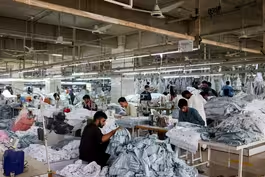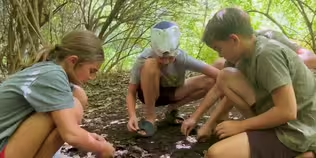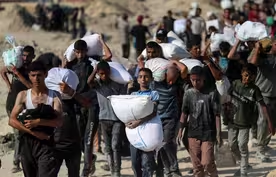
Former detainees speak out about abuse in El Salvador prison
Clip: 8/2/2025 | 5m 28sVideo has Closed Captions
Former Venezuelan detainees speak out about abuse in El Salvador’s mega-prison
In July, a three-country deal released 238 Venezuelan migrants the Trump administration had rounded up and sent to a notorious mega-prison in El Salvador. Now, some of the freed men are speaking out about the physical and psychological abuse they endured while locked up. Ali Rogin speaks with ProPublica reporter Melissa Sanchez for more.
Problems playing video? | Closed Captioning Feedback
Problems playing video? | Closed Captioning Feedback
Major corporate funding for the PBS News Hour is provided by BDO, BNSF, Consumer Cellular, American Cruise Lines, and Raymond James. Funding for the PBS NewsHour Weekend is provided by...

Former detainees speak out about abuse in El Salvador prison
Clip: 8/2/2025 | 5m 28sVideo has Closed Captions
In July, a three-country deal released 238 Venezuelan migrants the Trump administration had rounded up and sent to a notorious mega-prison in El Salvador. Now, some of the freed men are speaking out about the physical and psychological abuse they endured while locked up. Ali Rogin speaks with ProPublica reporter Melissa Sanchez for more.
Problems playing video? | Closed Captioning Feedback
How to Watch PBS News Hour
PBS News Hour is available to stream on pbs.org and the free PBS App, available on iPhone, Apple TV, Android TV, Android smartphones, Amazon Fire TV, Amazon Fire Tablet, Roku, Samsung Smart TV, and Vizio.
Providing Support for PBS.org
Learn Moreabout PBS online sponsorshipALI ROGIN: Last month, a three country deal released 238 Venezuelan migrants the Trump administration had rounded up and in March sent directly to a notorious megaprison in El Salvador.
President Trump and his aides claimed those men were citizens, savages, monsters and the worst of the worst.
But a review of government data by ProPublica, the Texas Tribune and a team of Venezuelan journalists suggested that officials knew at least 197 of the men were not convicted of crimes in the US.
We reached out to the White House for comment.
White House spokesperson Abigail Jackson said, quote, the Trump administration is grateful for our partnership with Salvadoran President Nayib Bukele to help remove the worst of the worst violent criminal illegal aliens from American communities.
Now some of the freed men are speaking out, saying they endured physical and psychological abuse while locked up.
This is Juan Jose Ramos Ramos.
ProPublica's Melissa Sanchez is one of the authors of this report.
Melissa, thank you so much for joining us.
We just heard from Juan Jose Ramos Ramos talk about how he wanted to end his life rather than stay in this prison.
Was that a common sentiment that the men you spoke with voiced?
MELISSA SANCHEZ, ProPublica: Yes, it was.
Unfortunately.
I spoke with six of the men who were released a week and a half ago now, two weeks ago now, and every single one of them said that at some point while they were there for four months in that prison, they thought about killing themselves, that they wished that they were dead instead of continuing to be tortured.
And that was the word that they used over and over, torture.
ALI ROGIN: And how did they describe the conditions in the prison?
MELISSA SANCHEZ: I mean, from the day that the planes landed in El Salvador and they were bused to the prison, they said that they were beat constantly by the guards, that they were hit with batons, that they were kicked in the face, kicked in the chest, that they were walked on top of that they were punched, that they were their heads were grabbed and banged against walls over and over.
The verb that they would use is kind of like their heads were split open.
They said it was just constant pain and blood.
ALI ROGIN: You also spoke with another detainee named Leonardo.
What brought him to the U.S. and what happened to him subsequently?
MELISSA SANCHEZ: He had come to the U.S. in the summer, last summer of 2024, and had come because his mother had some complicated medical issues after a car accident back in Venezuela.
He was a soccer coach for kids and he just wasn't making enough money.
And Venezuela's collapse economy.
And at the time, during the Biden administration, there was a program called CBP-1 where you could use a phone based app to sort of apply to get an appointment to go to the border and make your case for asylum.
And so he did that.
He didn't want to try to cross illegally.
He wanted to do this the right way.
And at his appointment in October of last year, he said that officials sort of set him aside and asked him whether he had tattoos on his body.
So he said that yes, he had tattoos.
And they set him aside and told him he would go through a different process.
And from that day in October, he was in U.S. detention until March 15 when he was sent to El Salvador.
ALI ROGIN: And Melissa, one of the things that's interesting about what you just said is that Leonardo started having issues with ICE under the Biden administration.
They took him aside for having tattoos, which seems similar to what we're hearing the Trump administration do, although of course, Biden did not then deport them to third countries.
Were you surprised to learn of the practices that were also employed under the Biden administration?
MELISSA SANCHEZ: No.
I mean, this is something we've been hearing for some time.
There is an issue when people are coming from a country with which we don't have diplomatic relations that it becomes difficult for immigration officials to really vet their criminal backgrounds.
And so what I've been told is that because this was the case with Venezuela, that officials at the border ended up using whatever they could to try to decide whether to let somebody in or not.
And one of the obvious things was tattoos.
And we know that, you know, there's a gang in Central America called MS-13 that very prominently uses tattoos as part of like, gang membership.
But that's not the case with the gang that Trump is saying all these guys are a part of.
So, yes, under the Biden administration, they were using this evidence, so called evidence of tattoos, and it wasn't legitimate, but they weren't imprisoning people in a foreign country at the time.
ALI ROGIN: So the men you spoke with were released.
Where are they now?
What are they doing and how are their families doing?
MELISSA SANCHEZ: So they're back in Venezuela.
The men I've spoken to can't sleep, they tell me -- Leonardo and others have told me that they close their eyes and then they just remember being beat constantly.
They have a lot of nightmares.
Some of the men are telling me they're desperate to look for work.
Others are thinking about migrating again somewhere, anywhere, maybe not the U.S. a lot of them told me they're looking for psychological help.
ALI ROGIN: Melissa Sanchez with ProPublica, thank you so much for bringing us the story.
MELISSA SANCHEZ: Thank you.
Economist analyzes fallout of Trump’s sweeping tariffs
Video has Closed Captions
Clip: 8/2/2025 | 5m 26s | Economist analyzes fallout of Trump’s sweeping new tariffs and firing of BLS commissioner (5m 26s)
How the ‘Creek Crawlers’ are inspiring others this summer
Video has Closed Captions
Clip: 8/2/2025 | 5m 22s | How the ‘Creek Crawlers’ are using their summer vacation to inspire others (5m 22s)
New book explores the science behind ‘super aging’
Video has Closed Captions
Clip: 8/2/2025 | 4m 47s | New book explores the science behind ‘super aging’ and longer, healthier lifespans (4m 47s)
News Wrap: More aid-seekers in Gaza killed by Israeli forces
Video has Closed Captions
Clip: 8/2/2025 | 2m 49s | News Wrap: Dozens more aid-seekers in Gaza killed by Israeli forces, witnesses say (2m 49s)
Providing Support for PBS.org
Learn Moreabout PBS online sponsorshipSupport for PBS provided by:
Major corporate funding for the PBS News Hour is provided by BDO, BNSF, Consumer Cellular, American Cruise Lines, and Raymond James. Funding for the PBS NewsHour Weekend is provided by...















